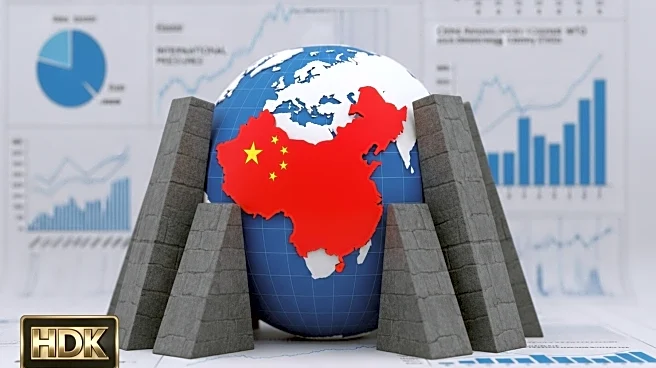What is the story about?
What's Happening?
China has announced it will no longer seek the special treatment afforded to developing countries under World Trade Organization (WTO) agreements. This decision, revealed by Commerce Ministry officials, comes in response to long-standing demands from the United States. The move is intended to bolster the global trading system, which is currently under threat from tariff wars and protectionist policies. Chinese Premier Li Qiang made the announcement during a speech at a development forum in New York, coinciding with the U.N. General Assembly meeting. The change will impact ongoing and future negotiations but will not alter existing agreements. Despite this shift, China maintains its status as a middle-income country and continues to identify as part of the developing world. The WTO's special provisions for developing countries include extended timelines for implementing trade agreements and technical assistance, which China will forego voluntarily.
Why It's Important?
China's decision to relinquish its developing country status in the WTO is significant as it addresses a major point of contention with the United States, which has argued that China, as the world's second-largest economy, should not benefit from such status. This move could potentially lead to more equitable trade negotiations and reduce barriers for foreign goods entering China's market, benefiting U.S. and European exporters. The decision also signals China's willingness to engage in WTO reforms, which could strengthen the organization's role in global trade governance. However, the impact on China's domestic economy and its trade relationships remains to be seen, as the country continues to provide loans and technical assistance to other developing nations.
What's Next?
The announcement may prompt other developing countries to reconsider their status within the WTO, potentially leading to broader reforms in the organization's treatment of member states. The U.S. and other major economies might push for further changes to ensure fair competition and access to markets. Additionally, China's decision could influence its trade negotiations and relationships, particularly with countries that have relied on its developing country status for favorable terms. The WTO's effectiveness and relevance in global trade discussions may be enhanced if more countries follow China's lead, prompting a reevaluation of the organization's role and policies.
Beyond the Headlines
China's decision to give up its developing country status could have long-term implications for global trade dynamics. It may alter perceptions of China's economic position and influence within international trade forums. The move also highlights the evolving nature of global economic power structures, as China transitions from a recipient of development aid to a provider. This shift could impact China's diplomatic relationships and its role in international development initiatives, potentially reshaping the landscape of global economic cooperation.

















